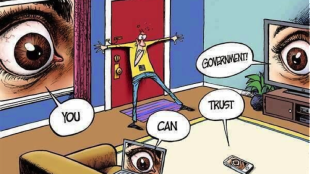Zooming in on Student Surveillance: Protecting Student Privacy in the Age of COVID-19
(Source) Exams are stressful even under the best of conditions. Exams taken virtually, as so many students over this previous year have found out, have presented a brand new set of challenges that can magnify student stress. But, imagine for a moment that you cannot even get into your exam, because the exam software does not recognize your face, or that the eye-movement tracking system built into the exam software could mean that looking away momentarily from your computer screen would result in you being flagged for cheating. This is, in fact, the reality that ample students have faced over the past year of virtual learning and testing. Indeed, when COVID-19 hit in early 2020, teachers and their students, from kindergarten to graduate school, had to quickly pivot to virtual learning and testing modalities. While this transition was certainly a necessity to keep students, their teachers, and their families safe, virtual learning and testing nonetheless raises civil liberties concerns around privacy and freedom of speech and perpetuates inequality for those who are people of color, low income, non-binary, or neurodivergent. In the United States, unlike in other countries, there is no “national” privacy law. Rather, a patchwork of laws make [read more]


